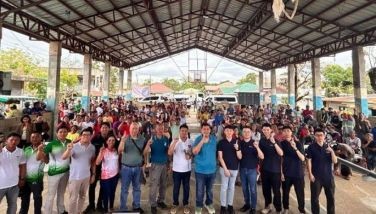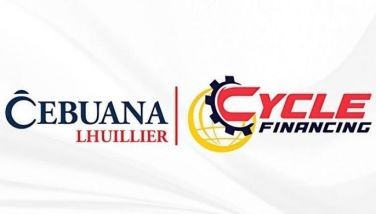MAN ON AMISSION
December 7, 2003 | 12:00am
 Norbert Kalau is a man on a mission–his father’s mission. And that’s true in more ways than one.
Norbert Kalau is a man on a mission–his father’s mission. And that’s true in more ways than one.
In 1956, Rev. Edmund Kalau and his wife Elisabeth were Christian missionaries serving on the islands of Palau and Yap in Micronesia. A constant part of their work involved ferrying sick people aboard their ships and taking them to the district hospitals on the mainland.
Due to the long distances and slowness of the ships, however, many patients died enroute. The reverend was deeply troubled and envisioned an aircraft for the patients, but he knew his mission organization was not prepared to begin an aviation program.
With that burden in his heart Edmund left his mission work and began to personally raise funds in the US and Germany. Although it took quite a long time, he was finally able to buy and fly a small plane from the states to Yap in 1974.
Thus was the Pacific Missionary Aviation (pma) born.
"My folks knew the needs of the people, and how much help could be provided with an aircraft, especially in critical medical situations. But more importantly, they did what they did because it was what God had called them to do," says Norbert Kalau, Rev. Edmund’s son and current president and ceo of the pma. "With irregular and often nonexistent transportation to the outside world in many parts of these islands, many of these people would otherwise just live and die without the hope of adequate medical, educational and, most importantly, spiritual help."
And the pma has provided just that. A year after its inception in 1974, the pma was incorporated in Guam. Their work was expanded to the Philippines in 1982, operating here as the Flying Medical Samaritans (fms, so as not to be confused with the pma or Philippine Military Academy).
"The primary goal of Pacific Missionary Aviation and the Flying Medical Samaritans is to glorify God, and to make our Lord Jesus Christ known to the peoples of Micronesia and the Philippines by providing and initiating the development of spiritual and social economic programs as indicated by the needs of the people we serve. We share the love of Jesus Christ through personal evangelism, discipleship, leadership training, church planting and church support," Norbert recites their mission statement.
Their goal is best fulfilled through the work that they have come to be known for: the free medical services that they bring to people in far-flung and unreachable areas.
Their work filled such a need for so many that Kalau’s vision "soon continued to expand". Medical missionary ships were commissioned into service in Micronesia and the Philippines to reach those atolls and islands with no airstrips. Church planting and evangelism intensified, especially in areas where doors had been closed "but now opened because of the committed services of the pma and the fms".
Norbert is careful, though, that the people do not simply get used to getting free treatment. But because poverty is a major factor in remote regions, they initiate economic programs which will encourage and enable people to become self-sufficient.
"If you give a hungry man a fish, he will be hungry tomorrow and you have done nothing more than teach him how to beg," Norbert quotes the familiar saying. "But if you teach him how to fish, well, that’s probably one of the biggest forms of help you can give anybody."
Over the years, the pma has established youth centers, a trade school and a printing shop. Also established in the Philippines were an orphanage and day care center, and a dormitory facility with youth ministries. It is an obvious query then, how they get their funds for such projects and services. From medicine to bible studies, the missionary has done it all for free.
"We live on donations alone, which is why we are currently looking for a corporate sponsor," Norbert says. "But we are very cautious about such because we want to make sure that those who want to help have nothing but good intentions in mind and no hidden objectives."
It doesn’t take a genius to realize that it costs a lot to maintain planes and ships and give out services for free. The pma is "lucky" to be hanging on with contributions from concerned people with "a few dollars or pesos to spare".
"Every little bit helps," Norbert explains. "But we appreciate those who give out of their hearts and not their pockets. I’d prefer a guy sending us P50 a month but says ‘I like what you’re doing and here’s a little bit of help’ than someone who throws us thousands but has personal goals in mind."
Many islands served by the pma and fms were previously accessible only by small outrigger canoe, and some remain that way to this day. High waves often make this form of travel very treacherous, rendering many of the small islands totally isolated for weeks on end. Airdrops of relief supplies immediately after a storm is often their only hope of survival.
And this is why, Norbert explains, their mini-airplanes are what generate most of the interest towards the mission. They are very important, he says, to be able to get to the most difficult terrains in the country.
But despite the mobility and accessibility provided by the planes, the fact remains that many patients from the outer islands still do not make it, according to one fms worker.
"Marami na ring tao ang namatay diyan sa eroplano nayan," the man says, pointing to the small plane. "Hindi na umabot sa ospital. Kawawa naman yung mga ’yon."
Norbert shares: "Often, we land on a nearby island and still must travel an hour or two by outrigger canoe, navigating treacherous reefs and often high waves, just to reach some of the islands."
Such determination and dedication to get to their patients no matter how distant or remote characterize pma and fms. Their successes, rather than the casualties, are the measure of the mission.
The mission provides free medical services to all, regardless of social status or religion, rendering Primary Health Care, family medicine, minor surgery, dental services, various eye surgeries and refractions. Eyeglasses are dispensed to indigent islanders. And through the joint efforts of churches, the staff and volunteers, "many are reached with life giving health and the message of hope in the Gospel of Jesus Christ."
One beacon of the gospel is the building and operation of the Bahay Kalinga orphanage in Naujan, Mindoro.
"We pray that our space problem will be solved by the children being adopted into homes they can call their own, because giving young children a proper start in life is paying big dividends at our orphanage," Norbert says. "Equipped with a saving knowledge of Jesus Christ, Bible training and good learning habits and skills, many of our former students are excelling as they progress through higher grades in school."
"There is nothing I’d rather be doing than this, making sure that I keep alive what my folks started," says Norbert with a palpable sense of pride and of commitment. "It really is a noble profession and we certainly hope everything will always turn out okay."
BrandSpace Articles
<
>
- Latest
- Trending
Trending
Latest













